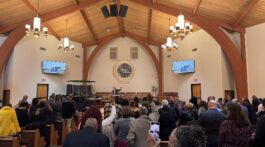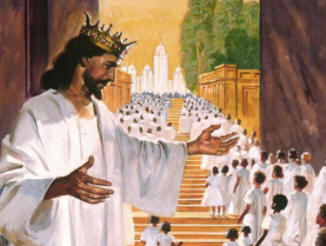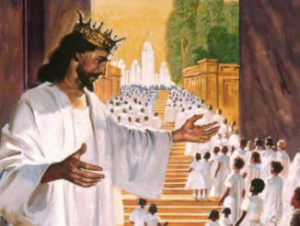A new yearly quarter of Bible study is upon us and what better topic to follow the message of the minor prophets than that of Revival and Reformation, the title of our lessons this quarter. At first glance, the terms seem synonymous, but this quote found on Friday’s lesson should help us differentiate the meanings.
“Revival and reformation are two different things. Revival signifies a renewal of spiritual life, a quickening of the powers of mind and heart, a resurrection from the spiritual death. Reformation signifies a reorganization, a change in ideas and theories, habits and practices. Reformation will not bring forth the good fruit of righteousness unless it is connected with the revival of the Spirit. Revival and reformation are to do their appointed work, and in doing this work they must blend.” ~Ellen G. White, The Advent Review and Sabbath Herald, Feb. 25, 1902
So although these elements must be present, they must also be seamlessly blended in the life of a Christian community. In other words, you can’t have revival without reformation, but you also can’t have reformation without revival. True success and growth will only happen when both are equally addressed.
This first week our main focus is on Revelation’s message to the Laodicean church. It’s a fitting church to zero in on, since it seems to pertain to the church of the latter days, God’s people just before the Day of Judgment. The name “Laodicea” means “a people judged”, a fitting name for the seventh church mentioned in John’s vision.
We all remember the problem of the Laodicean church. It was lukewarm. It appears that revival was badly needed to correct the situation, as we’ll see later in our study. But when revival is lacking, we can rightfully conclude that true reformation must be suffering as well.
The remedy for the Laodiceans is found in Revelation 3:20.
Memory Text: “Behold, I stand at the door, and knock: if any man hear my voice, and open the door, I will come in to him, and will sup [or dine, fellowship] with him, and he with me.” Rev. 3:20 KJV
Sunday: Hope for Lukewarm Laodiceans–Revelation 3:14
Each of the churches described in Revelation begin with different titles and descriptions of Christ. The titles given to this last church are designed to give hope to God’s people when they really need it, to encourage them to seek revival and reformation.
First, He is called the Amen in Revelation 3:14. We’ve all been to churches where “amens” are freely and frequently expressed during the sermon. There’s something about hearing this interaction, appropriately and reverently delivered, that makes us feel a spiritual revival of sorts in our own heart. It indicates that people are indeed listening and affirming what the pastor is preaching about. How very appropriate if all our congregations were “Amen” givers.
The word “amen” literally means “verily” and is used as an assent to a prayer, which is why it is often reserved for the end of a prayer. Let us keep in mind that the word is also used as a title for our Lord and Savior, and the use of it should be appropriate, as well as heartfelt.
The next title given to Jesus in verse 14 is “the faithful and true witness”. This seems quite accurate too when we think of someone or some group who has been revived and reformed. This is what makes us faithful and true witnesses like our Master. It takes faith to be revived, and reformation to be true to our calling. The way to witness most faithfully for God is to be both faithful and true.
Then Jesus is referred to as “the beginning of the creation of God”. Don’t be misled into thinking of Jesus as the first to be created. The Greek word for “beginning” is “arche” and was also used in Revelation 1:8 when Jesus said He was “the Alpha and the Omega, the beginning and the end”. Strong’s Concordance also translates “arche” as “chief”. So Jesus was the Chief when it came to the creation of our universe. We know He was the one who spoke our world into existence. See John 1:1-12. You might say He was the Beginner of the creation of God.
This last description of the Lord Jesus must have really given hope to the Laodicean believers. The One who gave life in the beginning is certainly able to bring spiritual life and re-birth to His followers.
Monday: A Loving Rebuke–v. 15-16
Revelation 3:15-16 contains perhaps the strongest rebuke of God to these churches. He says they are lukewarm, which means they are neither hot nor cold. In other words, they are not fanatical or heretical, they are just indifferent. And this is a state of being that God apparently dislikes enough to say He wants to spit them out of His mouth.
A fanatical person can often be made more balanced and temperate, and heretics can certainly be shown the truth and convert their thinking. But what can God do with lethargic, sleepy Christians? They indeed need this strongest of all rebukes to wake them up!
But after this hurtful image of God spitting us out, we recall an invitation from Hosea, the first minor prophet we visited last quarter. Hosea 6:1 says, “Come, and let us return unto the Lord: for he hath torn, and he will heal; he hath smitten, and he will bind us up.” KJV
So even though the rebuke hurts, God is waiting with open arms for us to experience His revival and reformation.
Tuesday: Perception and Reality–v. 17
Verse 17 reveals a wide gap between how the church sees itself and what image actually exists in the eyes of God. Like the church during Jesus’ lifetime on earth, we see ourselves as Scripture-reading, Sabbath-keeping, tithe-paying Christians. What more does God want? Evidently you can be all these things, and still be living in a spiritual desert.
Like the foolish virgins, we don’t have enough oil in our lamps to properly greet the bridegroom when He comes. And we need light so we won’t be blind guides, as Jesus called the religious leaders in Matthew 23:24, due to their impoverished spiritual condition.
But not only is God’s church at this time blind, they are also poor and naked, all the while seeing themselves as rich and well-dressed.
Personal Thought Question: How do I envision my Christian life? Am I willing to allow God’s Light to shine on my heart and lead me to an even closer walk with Him? Is it possible to have more of God’s Spirit guiding me every step of the way?
Wednesday: The Divine Remedy–v. 18-19
The best counseling session, the most valuable doctor’s prescription, the greatest natural remedy–none of these comes close to the divine advice given to His seventh church in Laodicea.
Each ailment is addressed. For their spiritual blindness, they need eye-salve–the Holy Spirit enlightening them to recognize their true condition. For their spiritual poverty, they are offered gold tried in fire–trials and experiences that enrich their relationship with God. And for their nakedness, He clothes them with white garments, representing His pure and holy righteousness.
Personal Thought Question: What is my greatest spiritual need at this time and how can God be the solution?
Thursday: A Relentless Love–v. 20-21
This takes us back to our memory text. The thought of Jesus coming in and eating at our table is a humbling experience, for both parties. We are humbled by the humility that is required on Jesus’ part in coming into our lowly, despicable heart homes. And the fact that He, the Ruler of the Universe, doesn’t force His entry, but stands politely at the door and knocks, shows His great humility and love. How can we turn down such an appeal? It’s the only way revival and reformation can take place in our hearts or in our church.
Verse 21 is so revealing of this love. He says to the church of the last days: “To him that overcometh will I grant to sit with me in my throne, even as I also overcame, and am set down with my Father in his throne.” KJV
God’s throne is mentioned more times in Revelation than any other book of the Bible. It seems to be reserved here as the highest motivation for God’s people in the end times, when they need it most.
When Jesus interacted with His disciples before His crucifixion, He diverted their attention from the throne of God. Their attitudes of rivalry indicated that they were not ready to envision the glory around the throne just yet. But in John’s Revelation, the throne is depicted in all its power and majesty. A fitting reward and comforting vision for the difficult times God’s church would be facing.
Your Contribution to the “Class”: Why do you think God would rather have us cold or hot, rather than lukewarm? What other spiritual states could these temperatures represent? And what have you discovered in your life that motivates you out of spiritual apathy? (Please leave YOUR thoughts and additional comments below.)









